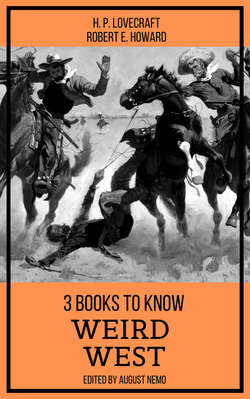Читать книгу 3 books to know Weird West - Говард Лавкрафт, Robert E. Howard, Говард Филлипс Лавкрафт - Страница 9
На сайте Литреса книга снята с продажи.
Part III
Оглавление––––––––
OF HIS YOUTH IN LUARCA, a small, placid port on the Bay of Biscay, Zamacona told little. He had been wild, and a younger son, and had come to New Spain in 1532, when only twenty years old. Sensitively imaginative, he had listened spellbound to the floating rumours of rich cities and unknown worlds to the north—and especially to the tale of the Franciscan friar Marcos de Niza, who came back from a trip in 1539 with glowing accounts of fabulous Cíbola and its great walled towns with terraced stone houses. Hearing of Coronado’s contemplated expedition in search of these wonders—and of the greater wonders whispered to lie beyond them in the land of buffaloes—young Zamacona managed to join the picked party of 300, and started north with the rest in 1540.
History knows the story of that expedition—how Cíbola was found to be merely the squalid Pueblo village of Zuñi, and how de Niza was sent back to Mexico in disgrace for his florid exaggerations; how Coronado first saw the Grand Canyon, and how at Cicuyé, on the Pecos, he heard from the Indian called El Turco of the rich and mysterious land of Quivira, far to the northeast, where gold, silver, and buffaloes abounded, and where there flowed a river two leagues wide. Zamacona told briefly of the winter camp at Tiguex on the Pecos, and of the northward start in April, when the native guide proved false and led the party astray amidst a land of prairie-dogs, salt pools, and roving, bison-hunting tribes.
When Coronado dismissed his larger force and made his final forty-two-day march with a very small and select detachment, Zamacona managed to be included in the advancing party. He spoke of the fertile country and of the great ravines with trees visible only from the edge of their steep banks; and of how all the men lived solely on buffalo-meat. And then came mention of the expedition’s farthest limit—of the presumable but disappointing land of Quivira with its villages of grass houses, its brooks and rivers, its good black soil, its plums, nuts, grapes, and mulberries, and its maize-growing and copper-using Indians. The execution of El Turco, the false native guide, was casually touched upon, and there was a mention of the cross which Coronado raised on the bank of a great river in the autumn of 1541—a cross bearing the inscription, “Thus far came the great general, Francisco Vásquez de Coronado”.
